The First Forum of Indigenous and Local Community Women in Central Africa and the Congo Basin
READ THE DECLARATIONOn May 8–12, 2023, Indigenous and local community women leaders joined international donors and philanthropies, and African ministers and political actors in Brazzaville to strengthen and promote the role of the region’s Indigenous and local community women and girls in climate resilience and biodiversity conservation.
The Congo Basin’s ecosystem in Central Africa is the world’s second lung after the Amazon rainforest, home to extraordinary biodiversity of crucial importance to global climate goals. Indigenous and local community women play a vital role in the management and protection of the natural ecosystems that store biodiversity, sequester carbon, sustain local livelihoods, and safeguard their cultures and traditional knowledge.
In order to value their often-ignored contributions to nature conservation and climate resilience—and above all to fight against widespread injustices and discrimination—REPALEAC and Indigenous women leaders partnered with RRI to host the First Forum of Indigenous and Local Community Women in Central Africa and the Congo Basin.
Resources
GLOBAL SOLIDARITY
Indigenous and local community women from across the world sing in solidarity at the first-ever Forum for Indigenous and Local Community Women in Central Africa and the Congo Basin, Brazzaville.
IN THE NEWS
- Mongabay | Inaugural Indigenous women’s forum spotlights Congo Basin conservation
- FairPlanet Magazine | Restoring the Congo Basin: Indigenous Women Leading the Charge
- Synchronicity Earth | Five Success Stories of 2023
- Radio France | A forum of Indigenous women and local communities in Central Africa and the Congo Basin (in French)
- Congolese Press Agency | Brazzaville: Forest management by indigenous women at the center of a forum (in French)
- Afrik 21 | Central Africa: Women’s direct funding mechanism for biodiversity
- TESA | Traditions are a great treatment for the preservation of species, environment in Africa (in Swahili)
- Congo Information Agency | Opening of the first forum of indigenous women in Brazzaville (in French)
Day 1
Indigenous and local community women, donors, and ministers arrive in Brazzaville
Tree planting along the Congo River to halt erosion
On May 8, in the early morning before the sun rose high and the heat of the waning dry season prompted us to seek shelter under the shade of nearby trees, more than 50 of us disembarked buses at a nearby park along the Congo River in downtown Brazzaville. This urban park has suffered greatly from erosion and deforestation.
Rosalie Matondo, the Minister of Forest Economy in the Republic of Congo (RoC) has sponsored a reforestation initiative to plant 5,000 acacia trees along the river to protect the land from erosion. Spirits were high and smiles were wide as we kneeled in the dirt to plant and water the seedlings.
“Planting these trees this morning is a symbol of our new partnership.” –Casey Box, Director of Global Strategy at the Christensen Fund.
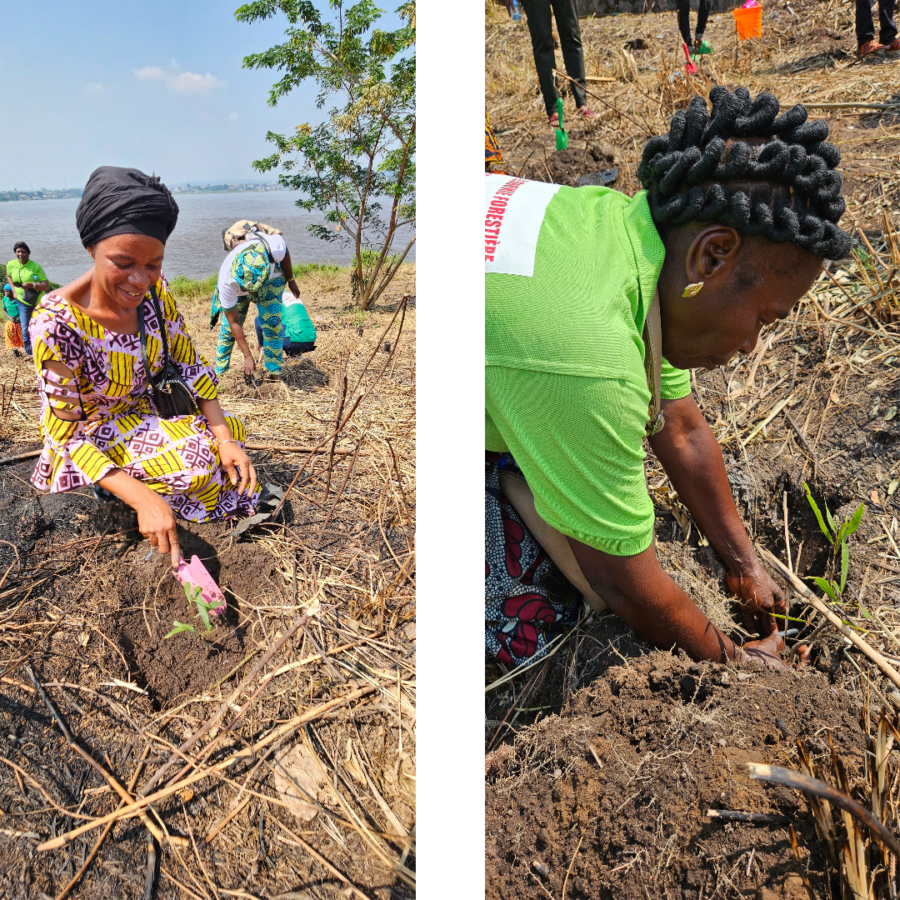
International donors, African ministers and government officials, representatives from non-governmental organizations, and Indigenous and local community women from around the world are meeting in Brazzaville to share experiences and learn how to scale up direct funding for women-led initiatives in Central Africa and beyond.
Matondo echoed similar sentiments at a welcome ceremonial dinner on Day 1 of the Forum, hosted and paid for by the Ministry of Forest Economy. “Welcome to Brazzaville! We hope this is just the beginning of a very long relationship to strengthen our partnership,” she said.
Delegates receive a joyous welcome
At dinner, Marlene SaÏra Flora Nguie, Coordinator of Community Action of the Indigenous Women of Congo (ACFAC) and REPALEAC’s women and youth program was appointed Advisor to Aime Wilfred Bininga, the RoC’s Minister of Justice, Human Rights and the Promotion of Indigenous Peoples who is supporting the forum.
REPALEAC Coordinator Joseph Itongwa, REPALEAC-Congo National Coordinator Parfait Dihoukamba, and Deputy Mayor of Congo-Brazzaville Dieudonne Bantsimba warmly welcomed the Minister and Indigenous and local community delegates and thanked the organizers for their tireless efforts to make the forum a success.
Dr. Margaret (Peggy) Smith, RRG Board Chair and an Indigenous Cree leader from Canada, recognized the commitments made by donors and the importance of increasing direct funding for Indigenous and local communities and sustainable development.
“We sincerely thank the leadership of all the Indigenous and local community women who take care of their families, their communities, and their countries so that Mother Earth can sustain all of us for future generations.” – Dr. Peggy Smith, RRG Board Chair

The forum will include several days of dialogue, exchange, and relationship building across the global North and South. Women from Burundi, Cameroon, Central African Republic, Chad, Democratic Republic of the Congo, Gabon, Republic of Congo, and Rwanda—in addition to international delegates from Malaysia, Panama, and Canada—also shared welcoming remarks.
“We are here to learn from each other, for each other, and for our Mother Earth. We are not divided, but united,” said Jenifer Lasimbang, an Indigenous delegate attending from Malaysia who previously served as State Assistant Minister of Education and Innovation.
An evening of song, dance, and good food has set the stage for a productive week of energy and solidarity.
Day 2
Ministers, donors, and organizers welcome delegates and storytelling from Central Africa takes center stage
As women and men from Africa, Asia, and North and South America slowly funneled into the event hall and found their seats, anticipation was high. The opening ceremony began with song and dance, and a cultural devotion ceremony led by a Native Sage woman from the Republic of Congo.
Opening ceremony
REPALEAC Regional Coordinator Joseph Itongwa and a representative from COMIFAC shared welcoming remarks and formally introduced Ms. Hortense Ngono, an Indigenous woman from the forests of Cameroon, as moderator to welcome each participant who travelled from near and far to attend the forum.
Sara Omi, the Women’s Coordinator of the Global Alliance for Territorial Communities (GATC) from Panama, welcomed international delegates in Spanish, while Casey Box, Director of Global Strategy at the Christensen Fund, which is one of the Forum’s sponsors, warmly greeted international philanthropies.
“We are here today because for too long, the incredible contributions of Indigenous and local community women for the protection and management of natural ecosystems in Central Africa and the Congo Basin have not received the attention they deserve,” said Dr. Solange Bandiaky-Badji, RRI Coordinator, in her opening speech.
“RRI and REPALEAC are committed to ensuring that this forum leads to concrete actions with a roadmap.”
After a speech by Rosalie Matondo, Minister of Forest Economy in the Republic of Congo (RoC), Aime Wilfred Bininga, the Minister of Justice, Human Rights and the Promotion of Indigenous Peoples of the RoC, officially declared open the First Forum of Indigenous and Local Community Women in Central Africa and the Congo Basin.
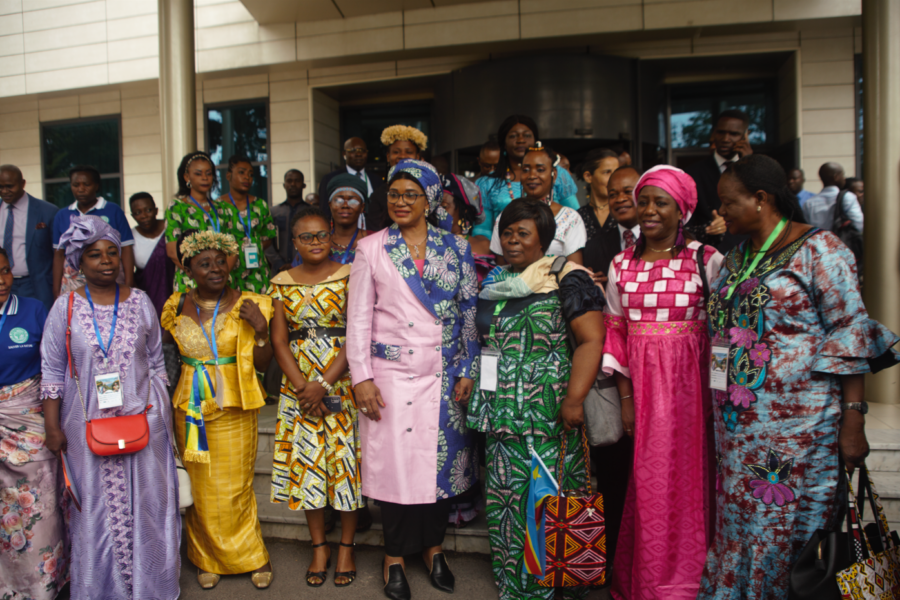
Storytelling from the forests of Central Africa
For Indigenous and local community women, the forests of the Congo Basin act as pharmacy, hospital, and market. In Cameroon, the quills of porcupines help cure sick children. In the Democratic Republic of the Congo (DRC), medicinal plants fix broken bones.
“We have not been to school, but we can still teach our children because of the forests,” said Mukawa Namurunga, an Indigenous elder from South Kivu province, DRC.
In Chad, community women use incantation and intergenerational knowledge to communicate with animals and protect their community. When a lion is enraged, Indigenous Mboro women speak with the animal to block their mouth and prevent them from attacking.
“We always live in harmony with nature; animals, plants, and people,” said Aissatou Aissatou Oumarou, Mboro leader of REPALEAC-Chad.
At the forum, community solidarity was strong. French and English-speaking community leaders were quick to jump into an interpreter role so that women could speak in their native Indigenous language to communicate their stories and lived experiences.
For Marie Dorothée Lisenga Bafalikike, an Indigenous Baaka woman and Griot (singer) from Yahuma territory in the DRC, the preservation of Indigenous languages and cultures is key. “Language is where our culture and traditions live,” she said.
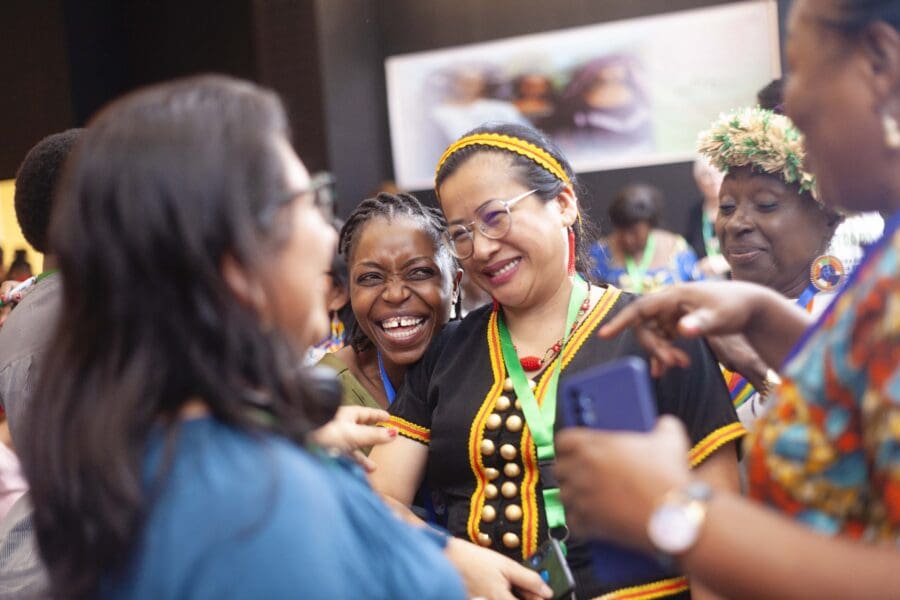
The day concluded with presentations by Indigenous and local community women delegates from the eight Central African countries where REPALEAC works: Burundi, Cameroon, Central African Republic, Chad, DRC, Gabon, Republic of Congo, and Rwanda.
Common themes emerged in their presentations and their testimonials will be used to draft the first-ever roadmap at the end of the forum:
- How song, dance, traditional medicine, rituals, seasons, and prohibitions according to Indigenous customs and traditions contribute to biodiversity conservation;
- How collecting, harvesting, hunting, fishing, agriculture, pastoralism, and local economies contribute to climate resilience and adaptation; and
- How renewable energy, agroecology, reforestation and restoration, and the creating of local products contribute to climate change mitigation.
Day 2 was also an opportunity for the women of Central Africa and the Congo Basin to present their own solutions to the world’s most pressing problems.
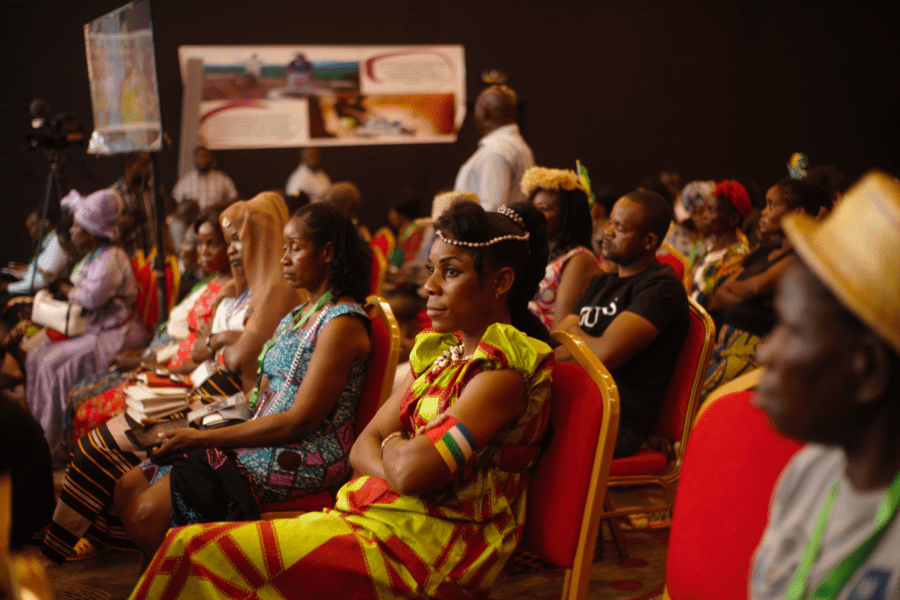
Day 3
Presentations and panel discussions showcase women’s leadership and solidarity on a global scale
On day 3 of the forum, Indigenous and local community women leaders from Africa, Asia and North and South America spoke about their struggles, challenges, and triumphs in biodiversity conservation and climate resilience, and how their communities are defeating all odds to protect and defend their human and land rights.
In the morning, we heard from powerful women speakers on some of the challenges they face in Africa regarding land and resource rights. Themes of leadership and capacity building, girls’ education, and the transmission of traditional knowledge emerged.
Challenges and solutions to women’s land rights
Brunelle Ibula Bolondo, Indigenous Pygmy and National Coordinator of AFAC spoke about how the rich and biodiverse forests of the Democratic Republic of the Congo (DRC), are being exploited and destroyed. “The forests are our home. It’s how we feed our children, but they’re being destroyed.” In the DRC, many Indigenous women are leaving their communities to seek new opportunities in cities, resulting in the loss of traditional knowledge and broken familial ties.
In Chad and Cameroon, married women have access rights to their husband’s land but rarely benefit from full ownership, and unmarried women benefit even less. “Only men have the space to cultivate the land,” said Didja Tchari, an Indigenous woman leader and member of REPALEAC-Chad.
And yet, when her community undertook a cartographic mapping of their village and community lands, it was discovered that it was the women who knew the land better than men.
Marthe Muhawenimana, a Batwa woman and member of REPALEAC-Rwanda, shared similar sentiments and highlighted how mothers, grandmothers, and sisters in her community are keeping their traditions alive despite all odds. “We try to send our girls to school, but when we can’t, we teach them from the forests.” In Marthe’s community, women and girls empower themselves economically by selling handicrafts and animal biproducts at local markets using materials sustainability harvested from the forest.
RRI’s Africa Program Director Patrick Kipalu facilitated a session where three women recipients of funding from the Bezos Earth Fund spoke about how direct finance has positively impacted their communities. With many prominent donors in the room, Savana Nnanga Obiang (Gabon), Marleine Saïra Flora Nguie (Republic of Congo), and Marie Dorothée Lisenga Bafalikike (DRC) shared lessons learned and best practices that simultaneously recognize Indigenous and local community women’s rights and help protect the Congo Basin from climate change and deforestation.
“The land should not impoverish us women; the land is rich,” said Marie Dorothée in her presentation.
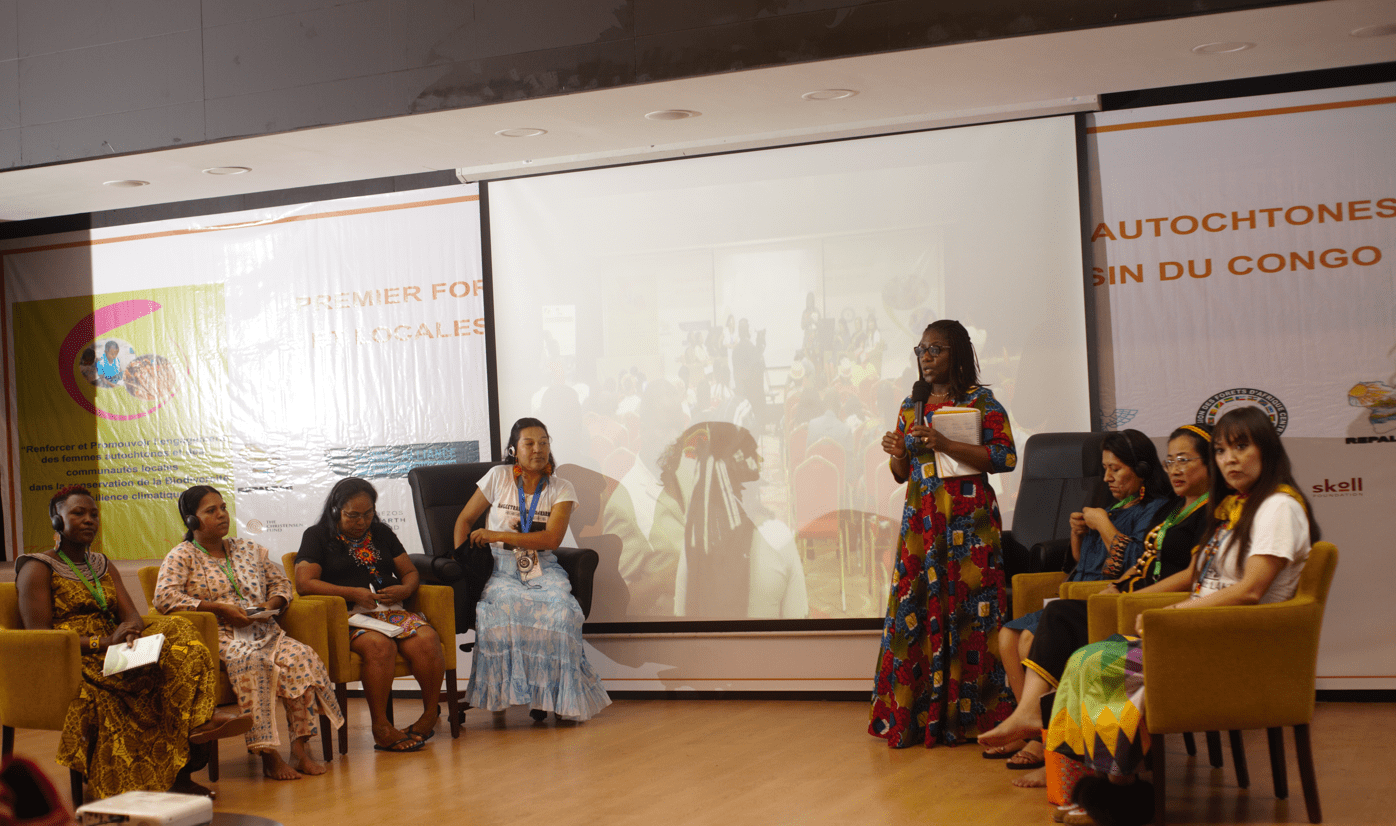
International delegates share lived experiences to initiate cross-regional solidarity
In the afternoon, RRI Coordinator Solange Bandiaky-Badji facilitated a panel discussion with women leaders from seven countries (Brazil, Canada, Kenya, India, Panama, Peru, and Malaysia). Despite communicating in four languages, the energy and level of solidarity that the panel generated was electric and acted as fuel for the working session that followed.
Stephanie Thorassie, a member of the Sayisi Dene First Nation and Executive Director of the Seal River Watershed Initiative in Canada, shared that although forum participants may live thousands of miles apart, the similarities in their challenges are abundant. In Canada, she shared that her community was forcibly evicted from their lands and placed in residential schools causing intergenerational trauma that exists to this day. Evictions of Indigenous communities are ongoing in nearly every corner of the Earth.
“We all have the same struggle and the same fight. I am with you,” said Omayra Casama Samana, an Indigenous leader from Panama.
“I feel like I am family already,” added Jenifer Lasimbang, an Indigenous delegate attending from Malaysia who previously served as State Assistant Minister of Education and Innovation.
Day 3 ended on a high note with dancing and a solidarity chant as the women are now preparing to draft a roadmap that will identify the actions needed to establish a sub-regional fund for Indigenous and local community women in Central Africa for their conservation and climate resilience efforts.
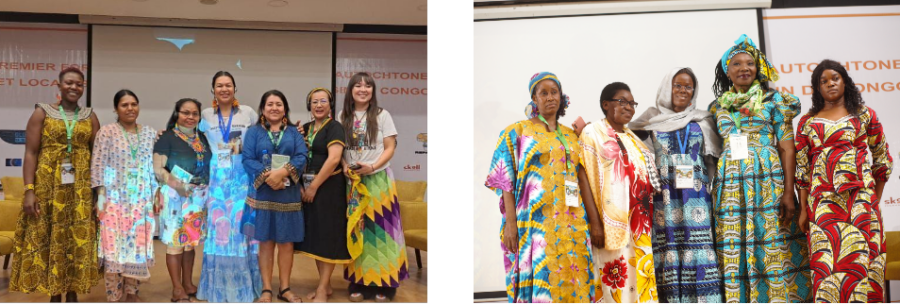
Day 4
Working sessions lay the groundwork for roadmap and Brazzaville Declaration
During day 4, delegates from REPALEAC countries in Central Africa and the Congo Basin (Burundi, Cameroon, Central African Republic, Chad, Democratic Republic of the Congo, Gabon, Republic of Congo, and Rwanda) broke out into working groups to identify recommendations and concrete actions for the Brazzaville roadmap. International delegates joined the sessions in solidarity with their African sisters in the spirit of knowledge sharing.
Drafted using consensus decision-making, the roadmap and Brazzaville Declaration—two of the key outputs of the Forum—synthesize takeaways and recommendations from the Indigenous and local community women leaders of Central Africa.
“Our stories should not be told by anyone but us. We are the force holding our Mother Earth together,” said Hortense Ngono, an Indigenous woman leader from Cameroon and moderator of the forum.
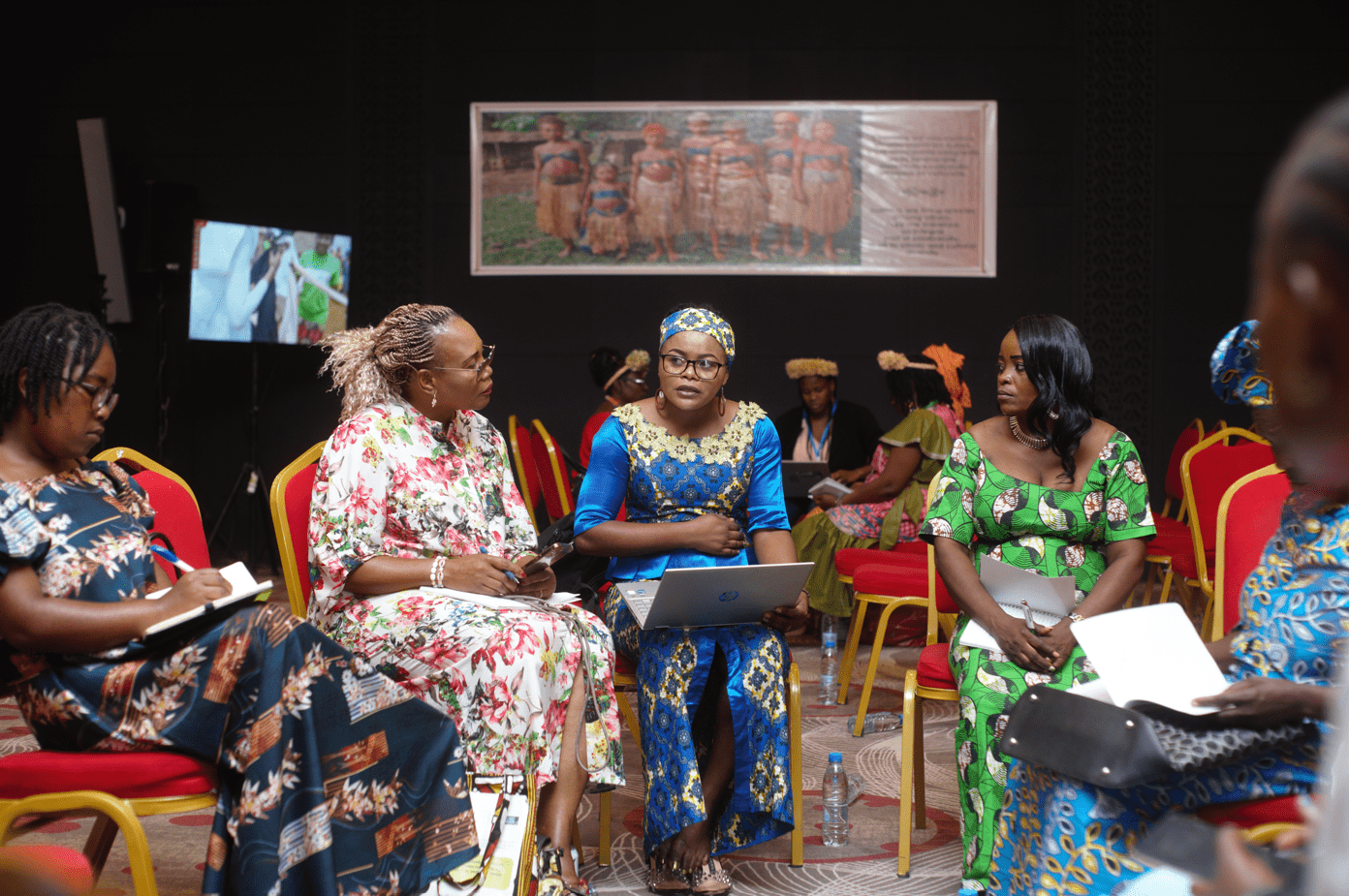
It was agreed that both the roadmap and Declaration will be translated and distributed in local Indigenous languages as well as English, French, and Spanish. Throughout the forum, women leaders identified the urgent need to preserve intergenerational knowledge, including language revitalization and documentation. “Language is where words and cultures live,” said Marie Dorothée Lisenga Bafalikike, Indigenous Baaka from the Democratic Republic of the Congo.
To prepare for the final reading of the Declaration, the women worked together to build their own roadmap that clearly expressed to international donors, African ministers and policymakers, and multilateral institutions what they want and need to be able to continue protecting Earth’s most biodiverse landscapes.
Ketty Marcelo Lopez, an Indigenous woman leader from Peru, said it best: “We are building our own road and our own future. Now you must listen to us.”
Read the speaker profiles here.
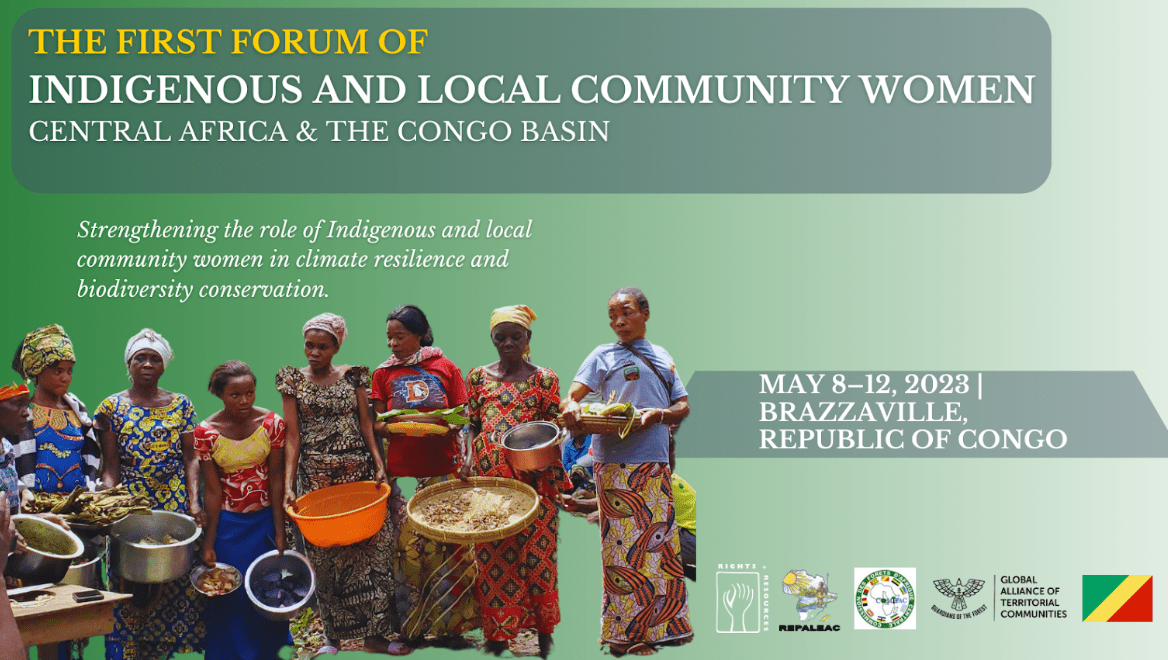
Banner and flyer Photo Credits: REPALEAC. Header: Indigenous women collect water at a local river, DRC; background document: Indigenous woman holds insects in right hand, DRC.
